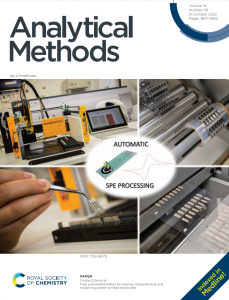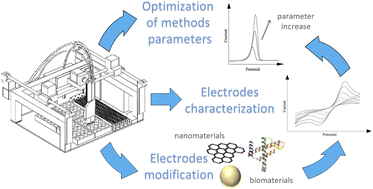Fully automated station for testing, characterizing and modifying screen-printed electrodes
Use of electrochemical biosensors based on printed electrodes in practice is one of the main goal of Research group for biomarkers. In cooperation with the University of Pardubice, they have developed an automatic device that brings this dream closer to reality. Journal Analytical Methods appreciated years of work and enabled them to present the results on the front page of issue 39.
Abstract
Electrochemical detection systems that provide either quantitative or sample-to-answer information are promising for various analytical applications in the emerging field of point-of-care testing (POCT). Nevertheless, in mobile POC systems optical detection is currently more preferred compared to electrochemical detection due to the insufficient robustness of electrochemical detection approaches toward “real world” use. Over the last couple of decades, screen-printed electrodes (SPEs) have emerged as a simple and low-cost electrochemical detection platform. Here, we report, firstly and solely, a novel benchtop system for the processing of electrochemical methods on SPE platforms. Our solution prevents operator errors from occurring while processing and testing SPEs, achieves an automatic processing of more than 300 electrodes per day and enables comparative testing due to the presence of two simultaneous working channels; furthermore, the SPEs used can be stored in specially-designed cartridges. This novel device helps to overcome the major disadvantages in processing SPE technology, such as a low level of automation and issues with process repeatability, making this technology more efficient and enabling faster growth in industry.
https://pubs.rsc.org/en/content/articlelanding/2022/AY/D2AY01123A



